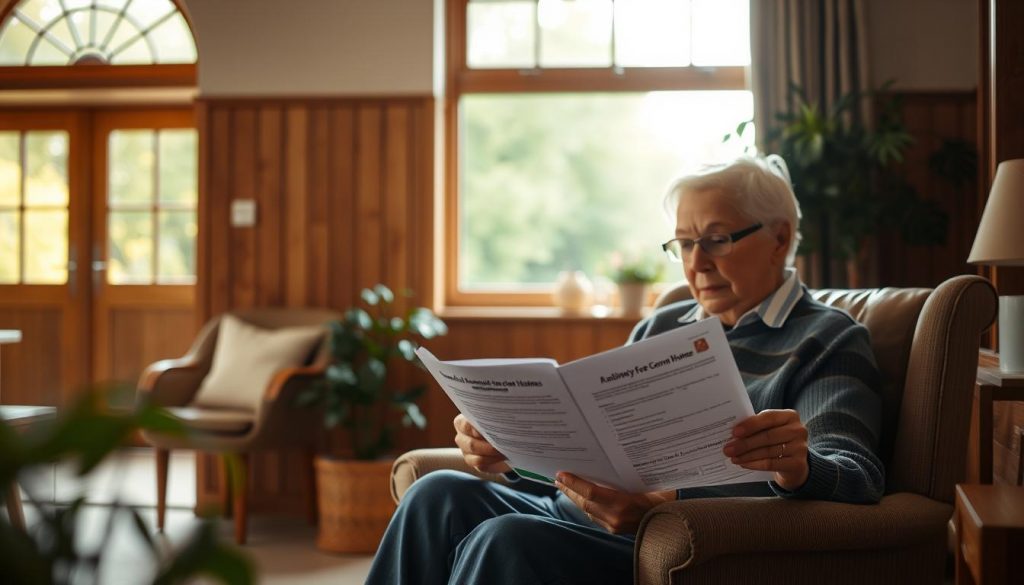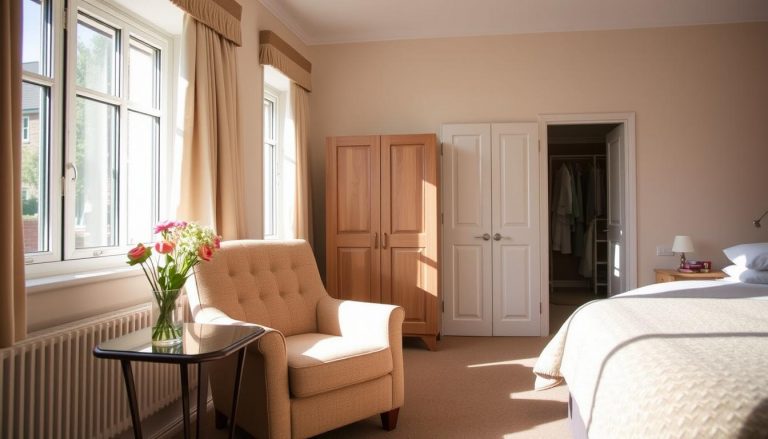Navigating the complexities of care fees and their impact on second homes can be a daunting task, especially when considering the financial implications for your family’s future.
We understand the concerns that come with planning for the future, and we’re here to guide you through the process. In this article, we’ll provide a comprehensive overview of how second homes are treated in care fee assessments, helping you make informed decisions about your assets.
As experienced professionals, we’ll walk you through the key considerations and strategies for managing residential care costs in relation to your property, ensuring you’re well-equipped to plan ahead with confidence.
Key Takeaways
- Understand how second homes are assessed for care fees
- Learn strategies for managing residential care costs
- Discover how to protect your family’s assets
- Gain insights into the UK’s care fee regulations
- Find out how to plan ahead with confidence
Understanding Second Home Ownership in the UK
Understanding the nuances of second home ownership is vital for UK homeowners, especially when considering the potential impact on care fees. Owning a second home can be a significant aspect of one’s financial portfolio and personal lifestyle.

Types of Second Homes
Second homes can vary widely, from holiday cottages to investment properties. According to the definition, a second home is typically considered a property that is furnished and not occupied as the owner’s main residence. This broad definition encompasses various types of properties, including apartments in holiday resorts, rural cottages, and even properties held for rental income.
Reasons for Purchasing a Second Home
People purchase second homes for a variety of reasons, including personal enjoyment, rental income, and as a potential legacy for their families. For some, a second home is a holiday haven where they can relax and spend quality time with family and friends. For others, it is an investment opportunity, generating rental income that can contribute to their overall financial stability, including potentially offsetting elderly care expenses.
Common Locations for Second Homes
Common locations for second homes often include popular holiday destinations or areas with potential for rental income. Coastal regions, rural landscapes, and areas known for their natural beauty are particularly popular. Understanding the local property market and the potential for rental income in these areas is crucial for making an informed decision about purchasing a second home.
It’s also important to consider how second home ownership can impact care home charges. The value of a second home is typically considered as part of an individual’s assets when assessing eligibility for state-funded care. Therefore, understanding the implications of second home ownership on care fees is essential for effective financial planning.
The Basics of Care Fees in the UK
Navigating the basics of care fees is essential for UK homeowners. Care fees are charges levied by care homes or local authorities for the provision of care services. Understanding who is responsible for paying these fees and how they are calculated is crucial for financial planning.
What Are Care Fees?
Care fees cover the costs associated with social care, including residential care, nursing care, and home care services. These fees can vary significantly depending on the type of care required, the location, and the level of support needed. As noted by a recent report, “the cost of care can be a significant burden on individuals and their families, highlighting the need for careful financial planning.”
“The financial assessment for care fees takes into account an individual’s income and capital, including their home, savings, and investments.”
For instance, the financial assessment for care fees considers an individual’s overall financial situation, including their income and capital. This assessment determines how much an individual must contribute towards their care costs.
Who Pays for Care Fees?
The responsibility for paying care fees typically falls on the individual requiring care. However, in some cases, the local authority may contribute towards the costs if the individual’s capital is below a certain threshold. It’s essential to understand that care fees are assessed based on an individual’s financial situation, including their income and capital.
To clarify, if you’re concerned about care fees, you might wonder if your next of kin is responsible for paying them. According to our detailed guide on care home fees, the answer is generally no, unless they have signed a specific agreement to take on this responsibility.
Understanding the intricacies of care fees and how they are assessed can help you better plan for the future. By being informed, you can make more effective decisions regarding your care and financial well-being.
How Second Homes Are Valued for Care Fee Assessments
When it comes to care fee assessments, the value of your second home is a key consideration. The process of valuing a second home can be complex, involving various factors that affect its overall worth. We will explore these factors and how they impact your care fee assessment.
Factors Affecting Home Valuation
The value of a second home for care fee assessments is typically based on its current market value. According to the Age UK factsheet 39 (April 2025), if there are expenses involved in selling the property, 10% is deducted from its value. Several factors can influence the valuation of your second home, including:
- Location and desirability of the property
- Condition and age of the property
- Local real estate market trends
- Any outstanding mortgages or liens on the property
For instance, a second home located in a highly sought-after area is likely to be valued higher than a similar property in a less desirable location. It’s essential to consider these factors when anticipating how your second home will be valued.
Professional Appraisals
In some cases, a professional appraisal may be necessary to determine the accurate value of your second home. This is particularly true for unique or high-value properties where a precise valuation is critical. A professional appraiser will consider various factors, including those mentioned above, to provide an unbiased assessment of your property’s value.
For more information on managing care fees, you can visit our page on how to avoid care home fees in the.
“The value of a second home is a significant factor in care fee assessments. Ensuring an accurate valuation is crucial to avoid overpayment.”
| Factor | Impact on Valuation |
|---|---|
| Location | Highly desirable locations increase property value |
| Property Condition | Well-maintained properties are valued higher |
| Market Trends | Local market trends can significantly affect property value |

The Impact of Second Homes on Financial Assessments
Understanding how second homes affect financial assessments for care fees is crucial for effective planning. When it comes to determining your eligibility for financial assistance with care fees, the value of your second home plays a significant role.
Counting Assets for Eligibility
When assessing your financial situation, local authorities consider various assets, including your second home. According to the Age UK factsheet 39 April 2025, if you have more than £23,250 in capital, you are required to pay the full cost of your residential care. This threshold is crucial in determining your eligibility for financial assistance.
The value of your second home is typically included in the overall assessment of your assets. This means that if you own a second home, its value will be added to your other assets, such as savings and investments, to determine your total capital.
The Importance of Capital Limits
Capital limits are a critical factor in determining your eligibility for financial assistance with care fees. As mentioned, having capital above £23,250 means you will need to pay the full cost of your care. It’s essential to understand how the value of your second home affects this calculation.
Key Considerations:
- The value of your second home is assessed as part of your overall capital.
- Capital limits can affect your eligibility for financial assistance.
- Understanding these limits can help you plan more effectively for your care fees.
“The presence of a second home can significantly impact your financial assessment for care fees. It’s crucial to consider how this asset affects your overall financial situation.” – Care Fees Expert
By understanding how second homes are counted in financial assessments and the importance of capital limits, you can better plan for your care fees and make informed decisions about your financial situation.
Exemptions and Allowances for Second Homes
Second homes can affect care fee calculations, but there are potential exemptions to consider. Understanding these exemptions can help you navigate the complexities of care fee planning and potentially reduce your financial burden.
Potential Exemptions for Rental Properties
If you’re renting out your second home, there might be circumstances under which it’s exempt from being considered in care fee assessments. For instance, if the property is being marketed for sale or rent, it may be treated differently. We recommend checking the latest guidelines on the UK government’s website for the most up-to-date information.
Living Arrangements and Their Effects
Living arrangements can significantly impact how your second home is treated in care fee assessments. For example, if you’re living in the second home, it might be considered your main residence, affecting its inclusion in the assessment. We will explore these nuances to help you understand how your living situation might influence care home charges.
Here’s a summary of potential exemptions and their implications for care fee assessments:
| Situation | Potential Exemption | Impact on Care Fees |
|---|---|---|
| Property being marketed for sale | Yes | May reduce care fees |
| Property being rented out | Possible | Could affect care fee calculation |
| Property is main residence | Yes | Likely to reduce or exempt care fees |

Understanding the exemptions and allowances for second homes can significantly impact your care fee planning. By considering these factors, you can make more informed decisions about your financial situation and potentially reduce your care home charges.
Legal Implications of Second Home Ownership
Understanding the legal implications of second home ownership is vital for effective care fee planning and inheritance strategies. Owning a second home can have significant legal consequences, particularly regarding care fees and inheritance.
Ownership Structures and Their Relevance
The way you structure the ownership of your second home can have a considerable impact on how it is treated in care fee assessments. As discussed in the Age UK factsheet 39 April 2025, the ownership structure can affect whether the property is considered an asset for care fee purposes.
- Sole Ownership: If you own the property outright, it will typically be considered part of your assets.
- Joint Ownership: If the property is owned jointly, only your share of the property will be considered in care fee assessments.
- Trusts: Placing the property in a trust can potentially protect it from being considered an asset, but this depends on the type of trust and its terms.
It’s essential to consult with a legal professional to determine the most appropriate ownership structure for your circumstances.
Inheritance Considerations
When owning a second home, it’s also crucial to consider the implications for inheritance. Your second home is likely to be part of your estate when you pass away, and understanding how it will be distributed is vital.
- Consider making a will that clearly states your wishes regarding the distribution of your estate, including the second home.
- Understand the potential inheritance tax implications and explore strategies to minimize these taxes.
- Discuss your plans with your heirs to avoid potential disputes.
According to recent guidelines, the ownership structure of a second home can significantly impact its treatment in care fee assessments and inheritance considerations.

By carefully considering the legal implications of your second home ownership, you can make informed decisions that balance your care fee responsibilities with your inheritance plans.
Strategies for Managing Care Fees with Second Homes
Managing care fees when you own a second home in the UK can be challenging, but there are strategies to help. As we explore the options available, it’s essential to consider your overall financial situation and care needs.
Selling vs. Keeping Your Second Home
One of the primary decisions you’ll face is whether to sell your second home or keep it. Selling your second home can significantly impact your care fee assessments, as it reduces your overall assets. However, this decision should be made with careful consideration of your personal circumstances and future plans.
- Pros of Selling:
- Reduces your total assets, potentially lowering care fees.
- Can provide a significant influx of capital.
- Cons of Selling:
- Loss of a potential inheritance for your family.
- Emotional attachment to the property.
On the other hand, keeping your second home means you’ll need to consider how it affects your care fee payments. It’s crucial to understand how your local authority assesses care service tariffs and how your second home factors into these calculations.
Equity Release Options
If you decide to keep your second home, one option to consider is equity release. This allows you to access the value tied up in your property without having to sell it.
- Benefits of Equity Release:
- Provides a tax-free lump sum or regular income.
- Allows you to remain in your home (if it’s your primary residence) or retain ownership of your second home.
- Considerations:
- Reduces the value of your estate, potentially affecting inheritance.
- May impact your eligibility for means-tested benefits.
It’s vital to consult with a financial advisor to determine the best course of action for your specific situation. They can help you navigate the complexities of second home care fees UK and ensure you’re making an informed decision.
Regional Variations in Care Fees Across the UK
Understanding regional variations in care fees is essential for effective financial planning in the UK. Care fees and local authority policies can vary significantly across different regions, impacting the overall cost of elderly care.
Differences in Care Costs by Region
The cost of residential care costs can differ substantially from one region to another. For instance, care homes in London and the South East tend to be more expensive than those in the North of England. According to the Age UK factsheet 39 (April 2025), these regional disparities are influenced by factors such as local property prices, demand for care services, and the availability of care providers.
When planning for elderly care expenses, it’s crucial to consider these regional differences. Families should research the prevailing care costs in their area or the area where their loved one resides to make informed decisions.
Local Authorities and Their Policies
Local authorities play a significant role in determining care fees and eligibility for financial assistance. Their policies can vary, affecting how elderly care expenses are assessed and funded. For example, some local authorities may have more generous allowances or different criteria for assessing care needs.
“The variation in care costs and local authority policies across the UK can be challenging for families to navigate. It’s essential to understand the specific policies in your region to plan effectively.”
To navigate these complexities, families are advised to consult with local authorities and financial advisors who are familiar with the regional nuances. This can help in making more accurate financial plans and avoiding unexpected costs.
- Research local care costs and policies.
- Consult with financial advisors familiar with regional variations.
- Consider the impact of regional differences on your financial planning.
Planning Ahead: Preparing for Future Care Needs
As we age, planning for future care needs becomes increasingly important to ensure we’re financially prepared. The cost of care can be significant, and without proper planning, it can impact our assets and the inheritance we leave for our loved ones.
Financial Planning for Long-term Care
Effective financial planning for long-term care involves understanding the potential costs and exploring options to cover these expenses. This includes considering care home charges and senior care pricing, which can vary significantly across different regions in the UK.
To plan effectively, it’s essential to:
- Assess your financial situation and understand your assets and income.
- Explore available options for funding care, such as savings, investments, and equity release.
- Consider the implications of different care scenarios on your financial situation.
For more information on how care costs can impact your inheritance, you can visit our page on the impact of care.
Importance of Professional Advice
Seeking professional advice is crucial when planning for future care needs. Experts can provide guidance on navigating the complex landscape of care funding and help you make informed decisions that align with your care needs and financial situation.
A professional advisor can assist with:
- Understanding the financial implications of different care options.
- Identifying the most suitable funding solutions for your situation.
- Developing a comprehensive plan that addresses your long-term care needs.
Here’s an example of how different factors can affect care costs:
| Region | Average Care Home Cost per Week | Average Home Care Cost per Hour |
|---|---|---|
| South East | £800 | £20 |
| North West | £650 | £18 |
| London | £1,000 | £25 |
By planning ahead and seeking professional advice, you can ensure that you’re prepared for future care needs and can maintain your financial stability.
Conclusion: Balancing the Benefits of a Second Home with Care Fee Responsibilities
Owning a second home can be a significant investment and a valuable asset for the future. However, it’s essential to consider the potential impact on care fees in the UK. We have explored the key aspects of care fees and second homes, including valuation, exemptions, and strategies for managing care fees.
Key Considerations
When assessing the financial implications of a second home, it’s crucial to understand how it may affect your care fee responsibilities. Factors such as the value of your second home, rental income, and local authority policies can all play a role in determining your care fees.
Planning for the Future
To ensure you’re well-prepared for future care needs, we recommend seeking professional advice on managing your assets, including your second home. By understanding the implications of second home care fees UK and nursing home costs, you can make informed decisions that align with your financial situation and care needs.
By taking a proactive approach to planning, you can balance the benefits of owning a second home with the potential costs of care fees, ensuring a more secure financial future.


